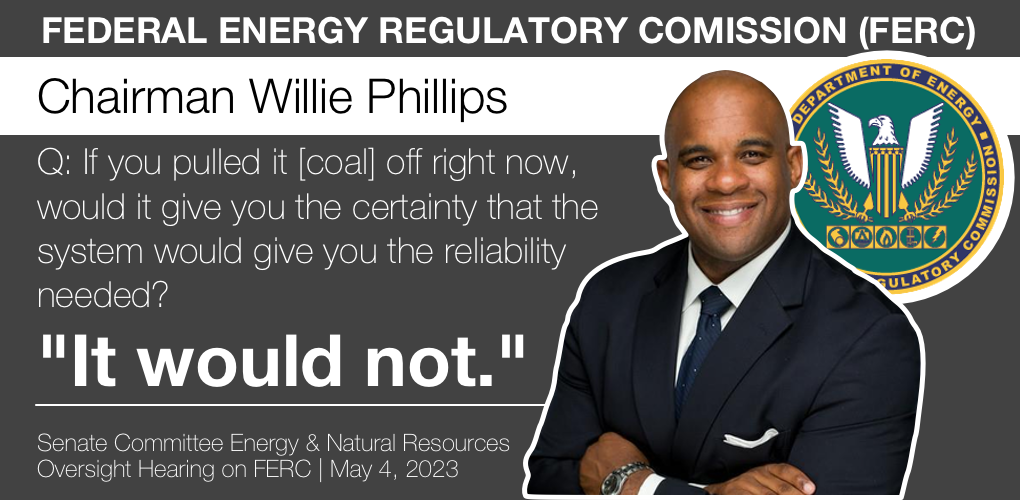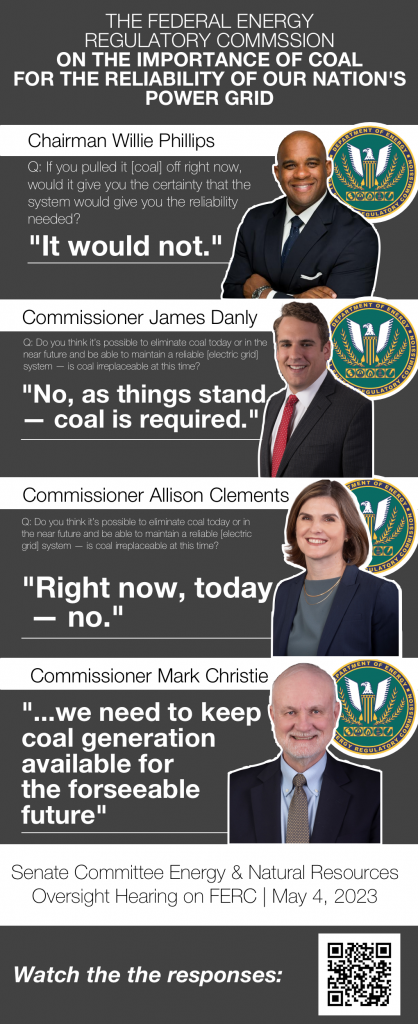
FERC Testifies to the Importance of the Coal Fleet
As the U.S. Environmental Protection Agency (EPA) charges ahead with its regulatory agenda aimed at driving the coal fleet off the grid, the Federal Energy Regulatory Commission (FERC) was on Capitol Hill last week warning of dire grid reliability consequences from the accelerating loss of essential coal capacity
From FERC to the North American Electric Reliability Corporation (NERC) to the grid operators themselves, the refrain is the same: the closure of essential generating capacity – notably coal capacity – is happening too fast as reliable replacements fail to materialize.
FERC Commissioner Mark Christie told the Senate Energy and Natural Resources Committee, “the United States is heading for a reliability crisis. I do not use the term ‘crisis’ for melodrama, but because it is an accurate description of what we are facing.” He added, “the core problem is this: dispatchable generating resources are retiring far too quickly and in quantities that threaten our ability to keep the lights on.”
Commissioner James Danly testified that, “we know that there is a looming resource adequacy crisis. Our market operators have been explicitly telling us as much for years.”
Even FERC Chairman Willie Phillips, appointed by President Biden, said, “I am extremely concerned about the pace of retirements we are seeing of generators which are needed for reliability on our system. NERC and the grid operators have warned us about this. We might be fuel neutral, but we are not reliability neutral.”
The Coal Fleet Remains Essential
Committee Chairman Joe Manchin opened the hearing with his own reliability warning, an indictment of EPA’s regulatory agenda and a reminder of the ongoing importance of coal to meeting peak power demand. He said, “while some may find these facts inconvenient, the reality is that our dispatchable coal power was one of the most reliable energy sources during Winter Storms Uri and Elliott. Coal power plants saw significantly fewer outages than natural gas plants.” He added, “the grid would have been absolutely decimated during these storms if our coal fleet was retired prematurely.”
After listening to the concerns of the FERC commissioners, Senator Manchin asked each (it’s worth a watch) “do you believe it’s possible to eliminate coal today or in the near future, and still be able to maintain a somewhat reliable system?”
Chairman Phillips answered, “It would not.”
Commissioner Danly answered, “No. Coal is required… and it would be impossible… to replace it.”
Commissioner Clements answered, “Right now, today, no.”
Commissioner Christie answered, “Coal is more reliable than gas. We need to keep coal generation available for the foreseeable future.”
The answers from all four commissioners couldn’t have been clearer. Unfortunately, how we manage the energy transition and how we value the coal fleet is not in the hands of FERC or NERC. It’s EPA at the steering wheel. And despite the warnings – despite the accumulating grid emergencies and capacity shortfalls – EPA is operating in an alternate reality where this reliability crisis doesn’t exist.
Even more alarming, EPA refuses to acknowledge it’s driving the crisis and that its regulatory blitz is precisely the opposite of what grid operators and reliability experts tell us should be happening. In fact, instead of changing course, EPA is hitting the accelerator with the unveiling of its new standards for greenhouse gas emissions for power plants expected this week.
There can be no responsible discussion of EPA’s rules – its entire suite of rules aimed at the coal fleet – without a clear-eyed examination of the Biden administration’s unwillingness to heed the warnings about the nation’s eroding grid reliability.
Instead of charging further down the wrong path, it’s past time to recognize the essential role the nation’s coal fleet can and should play in getting us to our energy future. Prematurely removing our coal capacity through policy mandates, without having reliable alternatives or the infrastructure in place to replace it, is a catastrophe of the Biden administration’s making.

- On May 10, 2023
